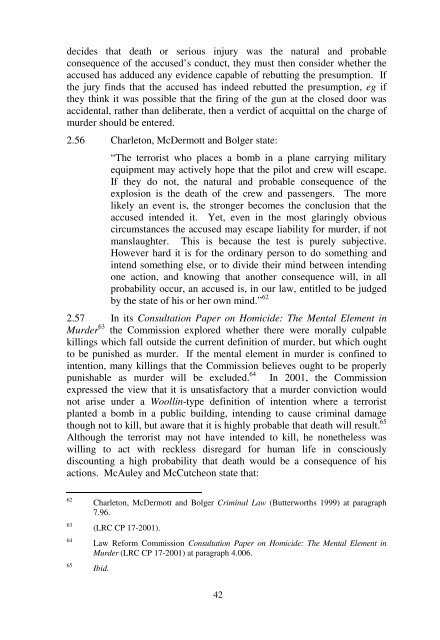murder and involuntary manslaughter - Law Reform Commission
murder and involuntary manslaughter - Law Reform Commission
murder and involuntary manslaughter - Law Reform Commission
You also want an ePaper? Increase the reach of your titles
YUMPU automatically turns print PDFs into web optimized ePapers that Google loves.
decides that death or serious injury was the natural <strong>and</strong> probableconsequence of the accused’s conduct, they must then consider whether theaccused has adduced any evidence capable of rebutting the presumption. Ifthe jury finds that the accused has indeed rebutted the presumption, eg ifthey think it was possible that the firing of the gun at the closed door wasaccidental, rather than deliberate, then a verdict of acquittal on the charge of<strong>murder</strong> should be entered.2.56 Charleton, McDermott <strong>and</strong> Bolger state:“The terrorist who places a bomb in a plane carrying militaryequipment may actively hope that the pilot <strong>and</strong> crew will escape.If they do not, the natural <strong>and</strong> probable consequence of theexplosion is the death of the crew <strong>and</strong> passengers. The morelikely an event is, the stronger becomes the conclusion that theaccused intended it. Yet, even in the most glaringly obviouscircumstances the accused may escape liability for <strong>murder</strong>, if not<strong>manslaughter</strong>. This is because the test is purely subjective.However hard it is for the ordinary person to do something <strong>and</strong>intend something else, or to divide their mind between intendingone action, <strong>and</strong> knowing that another consequence will, in allprobability occur, an accused is, in our law, entitled to be judgedby the state of his or her own mind.” 622.57 In its Consultation Paper on Homicide: The Mental Element inMurder 63 the <strong>Commission</strong> explored whether there were morally culpablekillings which fall outside the current definition of <strong>murder</strong>, but which oughtto be punished as <strong>murder</strong>. If the mental element in <strong>murder</strong> is confined tointention, many killings that the <strong>Commission</strong> believes ought to be properlypunishable as <strong>murder</strong> will be excluded. 64 In 2001, the <strong>Commission</strong>expressed the view that it is unsatisfactory that a <strong>murder</strong> conviction wouldnot arise under a Woollin-type definition of intention where a terroristplanted a bomb in a public building, intending to cause criminal damagethough not to kill, but aware that it is highly probable that death will result. 65Although the terrorist may not have intended to kill, he nonetheless waswilling to act with reckless disregard for human life in consciouslydiscounting a high probability that death would be a consequence of hisactions. McAuley <strong>and</strong> McCutcheon state that:62636465Charleton, McDermott <strong>and</strong> Bolger Criminal <strong>Law</strong> (Butterworths 1999) at paragraph7.96.(LRC CP 17-2001).<strong>Law</strong> <strong>Reform</strong> <strong>Commission</strong> Consultation Paper on Homicide: The Mental Element inMurder (LRC CP 17-2001) at paragraph 4.006.Ibid.42
















